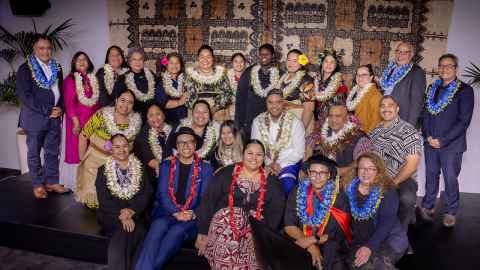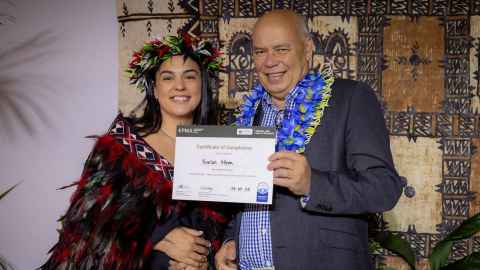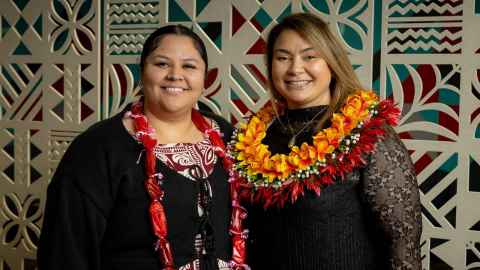University course pathway for Pacific aspirations
04 August 2025
More than 100 from workforce that supports Pacific people have first taste of university life.

A University of Auckland initiative designed to upskill sectors supporting Pacific people in Aotearoa celebrates lifelong learning from micro-credential to postgraduate pathways.
The one-semester programme introduces Pacific community frontline workers to postgraduate-level study. Micro-credentials have become an increasingly popular way to formally recognise skills and work experience.
Professor Sir Collin Tukuitonga, Associate Dean Pacific, Faculty of Medical and Health Sciences opened the ceremony at the Fale Maama, Pasifika Medical Association, on 25 July, acknowledging the third cohort of students who completed the course.
“Learning is meant to be joyful, especially when shared with family. If I can keep learning, so can you,” he said, congratulating the 23 students and acknowledging the role of family and community in their success.
He reflected on his own journey from the ‘Rock’ - the island of Niue, with limited resources and encouraged students to persevere and embrace the opportunities available today.
“None of us do these things on our own."
The course has become a transformative entry point for many, building academic confidence and providing tangible skills to support their communities. More than 100 students have completed the course since it began last year.

The course has become a transformative entry point for many, building academic confidence and providing tangible skills to support their communities. More than 100 students have completed the course since it began last year.
Christine Grumwald (Tonga, Russia, Polish) completed Improving Wellbeing Outcomes for Pacific Families last year. Now enrolled in a Postgraduate Certificate in Social Community Leadership, she is also the recipient of a Pasifika Medical Association scholarship.
Grumwald reflected on how the programme strengthened her leadership practice and enhanced her impact as a Pacific Learning Advisor.
“This programme gave me the space to critically reflect on the type of leader I am, and the type I aspire to be.
“It strengthened my ability to work in partnership with whānau and community, ensuring our Pacific learners aren’t just supported, but are truly seen, heard and valued.”
She recalled classes with Senior Research Fellow Dr Seuta’afili Patrick Thomsen, learning about the origins of Pacific Peoples.
“This was my introduction to postgraduate-level studies, and each lecture held nuggets of knowledge that inspired me to keep learning and growing.”
Learning that her ancestors were expert voyagers travelling across the Moana gave Grumwald a deeper understanding of the systemic racism and oppression Pacific peoples face.
“This presentation stayed with me as a reminder of the struggles we have to overcome as Pacific peoples. The micro-credential empowered me, then inspired me to explore the postgraduate certificate.
“This has impacted both my professional and personal life. It’s been much more than an academic achievement - it has been a transformative experience.”

Knowledge Hub Programme Manager Yvonne Sinclair, from the Office of the Associate Dean Pacific, says the course enables mature Pacific students an entry point into the University and for many, unlocking unrealised potential.
“This micro-credential course is more than just a university course. It’s an entry point into a space where they never imagined themselves - and where they are transformed in their academic confidence.”
She says students are also able to take tangible knowledge back into their roles and communities, influencing their families as well.
“The effect ripples into many areas of their lives, where a brave few take the leap to continue their studies because they value long-term growth over short-term gain.
“They see it’s possible through their efforts in the micro-credential and are encouraged because their lecturers, teaching staff and university support all look like them - and they feel supported to keep going.”
A new cohort have begun their studies in Ōtautahi.